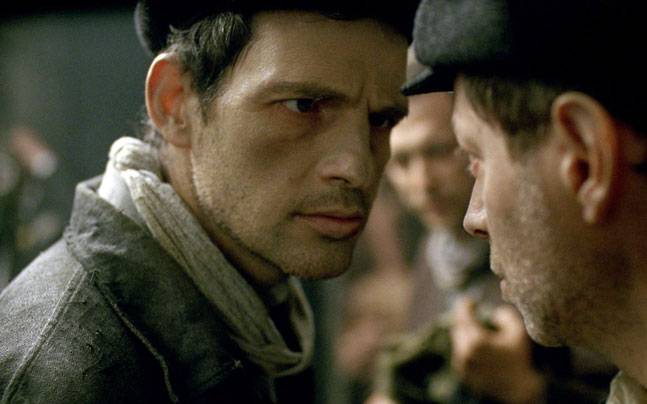To be a participant member of society, we must not avert our eyes from it's worst expressions. (Photo Courtesy Sony Pictures Classics.)
One of the 2015 Oscar nominees for best foreign film went to a challenging, small Hungarian movie that's already been cutting a profound swath on the international movie circuit. “Son of Saul” tells the story of a Nazi concentration camp captive who’s forced to cremate his own fellow prisoners.
The movie won best foreign film at the Golden Globes in January, dubious though that particular distinction may be. Earlier in the year, however, it won the prestigious Grand Prix at the Cannes film festival, and it’s collected a pile of other awards since.
But the question today is not whether this is a good movie. That's a conversation for different time. The question is whether audiences have a responsibility to spend hard earned money and precious free time with creative works that are neither uplifting, pretty, funny, or entertaining in the simplest sense. In short, what’s the responsibility of mainstream audiences to consume challenging art?
Right away this gets tricky. Clearly we understand that some things some people consider wonderful other people may find distasteful. There's a reason why pop music has overwhelmed classical music in terms of mainstream popularity, and it has nothing to do with whether Beethoven or Brahms knew what they were doing with a score. Even for those who might be willing to temporarily bump Beyonce for Bach, it's unlikely that many people are going to find as much patient accommodation for the likes of Alexander Scriabin, or modernists like George Crumb. They’re less accessible; they take more “work”. Their music doesn’t generally have a great beat and you can’t dance to their tunes. But you know what? The music is totally worth the time. It just requires active, intentional attention for it to fully reveal what riches it has to offer.
But see? It’s tricky. We could superficially say that these choices turn on matters of aesthetics, on accessibility as a basic measurement of value. Aesthetic “style” and literal “content” do not have a sharp line of demarcation. Style and substance blend into each other, sometimes overlapping, sometimes occupying the same space. But clearly some things speak more literally than others, and the question persists: what happens when substantive content presents big emotional challenges to audiences? That brings us right back to “Son of Saul”.
The movie focuses a steely gaze on what's arguably the most heinous crime of a millennium full of heinous crimes. It’s not the first word on the Holocaust and it’s not likely the last. But as a new, modern abstraction, the movie presents audiences with a choice. We can either avoid immersing ourselves in intellectual territory that makes us emotionally recoil, or we can plumb those dark depths because they speak about something vital for us to consider today.
A more nuanced reading of the situation might offer an appreciation of the craftwork itself. Just as we might not “like” a Jackson Pollock splatter painting, we can appreciate its energy, its passion, it’s verve. The same goes for stories that make us uncomfortable, that make us wince. In the telling of something that’s challenging, we gain something vital precisely because we are vicarious participants.
The risk that’s not discussed nearly enough in contemporary culture is the risk of endless entertainment. We can amuse ourselves with another iPhone app or disposable YouTube videos or we can, once in a while, tell ourselves that there are different stories and sounds and experiences to try. In doing so, we not only discover the colors of our own days (an admittedly self-interested perspective), but we enable ourselves to perceive parts of the world that might otherwise escape our notice. The risk is in opening ourselves to ideas, but it is only by being open to challenging ideas that we have any potential to transcend our origins.

